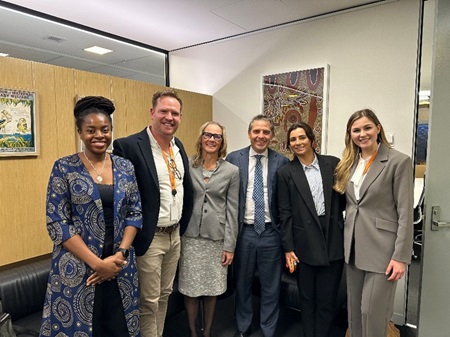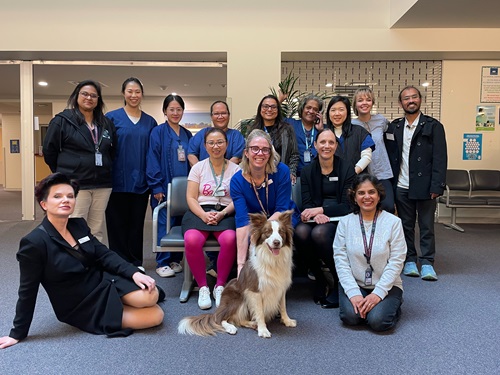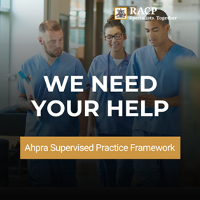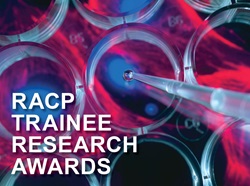The President's Message – 11 July 2025

Dear members
Many of you may not be aware of an extraordinary College resource available through the RACP website. You can search a detailed online catalogue of more than 30,000 medical books, journals and exhibits contained in the RACP History of Medicine Library in Sydney.
In an age of instant access to information via the web, many of these items simply aren’t available to read or view online, but provide a treasure trove of specialised medical information and historical content. If you’re interested in finding out more, please contact College Librarian Karen Myers.
This month I speak with Associate Professor Cate Storey OAM FRACP, Chair of the College’s Library and Heritage committee on why physical libraries are still so important in a digital age.
Kind regards
Professor Jennifer Martin
RACP President
As we come together to celebrate NAIDOC Week 2025, the Royal Australasian College of Physicians proudly acknowledges and embraces this year’s powerful theme, “The Next Generation: Strength, Vision & Legacy”. This theme reflects the enduring spirit and resilience of Aboriginal and Torres Strait Islander peoples, honouring the past, celebrating the present, and inspiring future generations to carry forward their rich cultures, knowledge, and leadership.
At the RACP, we recognise that our commitment to reconciliation and health equity is fundamental to improving the health and wellbeing of Aboriginal and Torres Strait Islander communities across Australia and Aotearoa New Zealand. Guided by our Indigenous Strategy Framework and the INNOVATE Reconciliation Action Plan, we are dedicated to fostering meaningful relationships, respect, and opportunities that advance self-determination and cultural safety within our health systems and medical profession.
This NAIDOC Week, we reflect on the importance of strength – the strength found in cultural identity, community, and connection; vision – the foresight to build a future grounded in health equity and inclusion; and legacy – the responsibility we all share to honour and protect the traditions, languages, and knowledge of Aboriginal and Torres Strait Islander peoples.
We acknowledge the vital role that cultural safety plays in delivering respectful, effective healthcare. Our ongoing work supports physicians and healthcare providers to deliver care that respects cultural diversity and promotes self-determination. Through education, partnership, and advocacy, we strive to ensure that Aboriginal and Torres Strait Islander peoples receive the highest standard of care, free from systemic barriers and inequities.
As we celebrate the rich cultures and histories that enrich our nations, we reaffirm our commitment to walking alongside Indigenous communities, learning from Aboriginal and Torres Strait Islander peoples’ wisdom, and working collaboratively towards a future where health equity is a reality for all.
To Aboriginal and Torres Strait Islander peoples, we honour your past, celebrate your present achievements, and look forward to a future inspired by your strength, vision, and legacy.
Happy NAIDOC Week 2025.
Professor Jennifer Martin, RACP President
This NAIDOC Week, we celebrate with pride, strength and solidarity to Keep the Fire Burning! Blak, Loud & Proud. For Aboriginal and Torres Strait Islander people, that fire – our cultures, our languages, our connections to Country and each other – has never gone out. It continues to guide us, heal us, and give us strength. It fuels our leadership in medicine, in community, and in the fight for health equity and justice.
As Chair of the RACP Aboriginal and Torres Strait Islander Health Committee, I’m proud to stand with our communities and colleagues in honouring the generations who’ve walked before us, and those who continue to lead the way today.
This week provides an important opportunity for us to reflect on how far we’ve come, but also to be honest about the work still ahead. Our health outcomes are still too often shaped by racism, exclusion and systems that weren’t built with us in mind. But we know what works – culturally safe care, community led solutions, and Aboriginal and Torres Strait Islander leadership in every space that affects our lives and wellbeing.
Self-determination isn’t just a buzzword – it’s at the heart of better health, stronger communities, and a more just future.
To our non-Indigenous colleagues and allies, we invite you to stand with us not just in celebration, but in commitment. Be part of the change. Listen deeply, act bravely, and walk with us – not just during NAIDOC Week, but every week.
Let’s keep the fire burning. Let’s keep showing up – Blak, Loud and Proud.
Dr Kimberley Male
Chair of the RACP Aboriginal and Torres Strait Islander Health Committee
The RACP recently issued a media release calling for a national strategy to address ongoing ADHD medication shortages, highlighting the considerable impact on families and clinicians.
As part of this advocacy, Dr Paul Hotton, President-elect of the Paediatrics and Child Health Division and Chair of the Chapter of Community Child Health, represented the RACP on the Medicine Shortages Action Group (MSAG) convened by the Therapeutic Goods Administration (TGA) to address ongoing shortages of methylphenidate products.
MSAGs are short-term, collaborative groups that bring together health professionals and patient organisations to inform the TGA’s response to critical medicine shortages.
The TGA has now updated its webpage ‘About the shortage of methylphenidate hydrochloride products’ to include clinical guidance developed by the MSAG and links to further resources. A web alert has also been issued to highlight this important update.
In addition, the TGA has approved a new overseas-registered alternative to be supplied through Section 19A of the Therapeutic Goods Act 1989: Methylphenidate Hydrochloride Extended-Release Capsules (LA) 60mg (Granules Pharmaceuticals Inc, USA).
Find out more
On 11 June, Professor Jennifer Martin, RACP President, met with The Hon Ryan Park MP, NSW Minister for Health and Minister for Regional Health, alongside Associate Professor Kudzai Kanhutu, College Dean and Interim Executive General Manager of Policy & Advocacy, and Dr Robert Tait, Interim NSW/ACT Committee Chair.
At the meeting, significant concerns were raised about the mounting pressures on the physician workforce in NSW. The discussion focused on the urgent need to support the physician workforce, safeguard the wellbeing of our members, and ensure the long-term sustainability of physician training in NSW.
The meeting was a valuable opportunity to highlight the depth of expertise within our membership and to express our strong commitment to working in partnership with the NSW Government to drive health system reform, particularly in light of the recommendations of the Special Commission of Inquiry into Healthcare Funding.
We look forward to working closely with the Minister and NSW Health to support and strengthen the specialist medical workforce across the state and drive meaningful improvements to the health system.

Pictured (left to right): Associate Professor Kudzai Kanhutu, College Dean and Interim Executive General Manager of Policy & Advocacy; Dr Robert Tait, Interim NSW/ACT Committee Chair; Professor Jennifer Martin, President of the RACP; The Hon. Ryan Park MP, Minister for Health and Minister for Regional Health; Lucy Bonafont, Senior Executive Officer, NSW/ACT Committee; and Madelyn Smith, Senior Policy and Advocacy Officer.

Looking to contribute to the work of the College and help shape the future of your profession? A range of College committees, working groups and other roles are now open for expressions of interest.
Getting involved is not only a great way to give back – it’s also a chance to expand your knowledge, stay connected to developments in your specialty, and enjoy the personal and professional rewards of meaningful contribution.
Some current opportunities you may be interested in:
More opportunities
In early June, the Auckland Adult Medicine Training Network delivered the largest Divisional Clinical Examination (DCE) ever run in Aotearoa New Zealand - an ambitious and inspiring milestone for our physician training community and the DCE.
In a major logistical and collaborative achievement, 40 Adult Medicine Basic Trainees were assessed over two days in a single, centralised “supersite” model, combining the efforts of three hospitals: Middlemore, Auckland City, and North Shore. This model replaced previously separate local exams and brought together:
- 81 examiners
- 101 patient volunteers
- 13 trainee helpers
- 150+ taxi journeys
- An average of 30,000 steps per LEO and RACP team member
- 8 RACP staff
- 6 nurses
- 5 hospital administration staff
- 1 therapy dog
The event was led by Network Director Dr Cheryl Johnson, Local Examination Organisers Dr Valerie Ozorio, Dr Becky Lane, Dr Joanna Wojciechowska, and Dr Aritra Ray in collaboration with DPEs Dr Oli Howlett and Dr James Wethasinghe and the RACP team. Their dedication, creativity and coordination ensured a smooth, standardised, and high-quality exam experience for all involved.

Feedback from candidates, examiners, and patients has been overwhelmingly positive. This centralised model not only enhanced efficiency and eased pressure on individual hospitals, it also improved the use of shared resources.
This is a powerful example of what can be achieved when we think collaboratively and boldly about how we train and assess future physicians. It also offers a valuable blueprint for the expansion of this model across other regions in the years ahead.
On behalf of the College, I want to acknowledge and thank every person who contributed to this outstanding effort including our RACP Fellow organisers, examiners, candidates, and the RACP team; as well as the nurses, administration staff and volunteer patients. You have set a new benchmark for the DCE and made a lasting impact on the future of physician training.

If you are training or supervising under one of the RACP’s new curricula programs, we want to hear from you. Your feedback is crucial so we can understand how the new curriculum is working in practice and ways to plan for future improvements.
We are currently seeking feedback from:
- First year Basic Trainees and their supervisors/DPEs
- First and second year Advanced Trainees and their supervisors
in the following programs:
- Cardiology (Adult Medicine)
- Paediatric Cardiology
- Gastroenterology (Adult Medicine)
- Gastroenterology (Paediatrics & Child Health)
- Geriatric Medicine
- Nephrology (Adult Medicine)
- Nephrology (Paediatrics & Child Health)
- Rehabilitation Medicine (Adult Medicine)
Complete an anonymous survey and, if you would like to share in more depth, book an individual interview with the RACP Evaluation team.
The survey closes on Thursday, 31 July 2025. Individual interviews will be held at a nominated convenient time in July or August.
Learn more and get involved by visiting our New Curricula Support Hub or reach out to us at evaluation@racp.edu.au
Find out more
With the aim of keeping trainees informed and supported across the College, the Training Accreditation Services team has developed a Guide for Basic Trainees on the Training Provider Accreditation Process.
This Guide is designed to help Basic Trainees understand the accreditation process and know what to expect if their training setting undergoes a Training Provider Accreditation review.
Now available on the RACP website, the Guide includes key information and supporting resources relevant to the role of a Basic Trainee. All Basic Trainees are encouraged to read through the Guide and keep a copy on hand for future reference.
Please email the Training Accreditation Services team if you have any questions: accreditationreview@racp.edu.au

Ahpra is conducting a review of the Supervised Practice Framework – this applies in many circumstances in the member life and career course: extended absences from practice and returning to practice, and when regulatory undertakings or conditions are imposed on a registrant, among others.
We are committed to participating in this important regulatory review of the Framework. Our aim is that the Ahpra regulatory requirements for physicians are streamlined, efficient, practical and implementable, and acknowledge your busy contemporary worksite environments, ensuring a balance between compliance and your wellbeing. Your feedback is vital.
We want to hear from you if:
- you have had an absence from practice for any reason and completed Ahpra regulated supervised practice requirements for return to practice
- you have provided this supervision, including supporting CPD components
- you have had to provide feedback on specific outcomes to Ahpra to support supervisee undertakings or conditions
- you are planning an extended absence and may be a future user of the framework.
Help us provide practical, effective advice to Ahpra by completing this short survey. No questions are mandatory, and you are welcome to provide your general view on good practice principles that should guide the regulatory approach to supervised practice to balance compliance and wellbeing. All feedback received will be deidentified.
Together we can have an impact on shaping a framework that supports both practitioners and patients.
The survey closes on Tuesday, 15 July 2025.
Take the survey
Professor Jaquelyne Hughes FRACP, was awarded the Arthur E Mills Medal at the RACP Convocation Ceremony, in Sydney in April.
As part of the Convocation procession, Professor Hughes was called to the podium by RACP President, Dr Jennifer Martin, and delivered a powerful and moving oration, entitled ‘Culture Practised in Medicine.’
The Arthur E Mills Oration was endowed in 1950 by his widow and established within the Royal Australasian College of Physicians for the promotion and encouragement of medical education and general culture. The Arthur E Mills oration is not given every year underscoring the importance and honour of Professors Hughes invitation to speak.
Professor Hughes wove her oration around the central character of Arthur E Mills, revealing a story of the modern Australian physician, committed to upholding culture, but also to changing practice and innovating to address the needs of patients and community. Professor Hughes invited the listeners to reflect on self, relationships to others, to place and time, and how this reflection can inform the new Cultural Safety Practice standard, mandated by the College.
Darwin is Professor Hughes hometown. Her medical training was in both the Top End and in Sydney. She is now a Royal Darwin Hospital Senior Staff Specialist Nephrologist, Clinical Research Professor and Matthew Flinders Professor of Medical Education.
Royal Darwin Hospital (RDH) doctors were present for the occasion, including Dr Emma Spencer, Director Physician Education RDH, and two past Darwin Basic Physician Trainees who gained fellowship at the ceremony; Dr Mel Carrol in gastroenterology and general medicine, was supported by her large family from Newcastle and Dr Ash Thomas in infectious diseases was supported by her parents, Drs Mahiban and Sujatha Thomas, both long term specialists at RDH who have contributed to service provision over many years.
Professor Hughes reflected that her RDH training experience equipped her with unique skills used in her advanced training in other states and highlighted that training in the Northern Territory equips developing physicians with local and nationally relevant clinical skills.
The Royal Australasian College of Physicians convocation celebrated new Fellows in the Adult and Paediatric and Child Health Divisions as well as trainees from the Faculties of Public Health Medicine, Rehabilitation Medicine and Occupational and Environmental Medicine, the Chapters of Sexual Health Medicine and the Chapter and Diploma recipients of Palliative Medicine. The ceremony was notable for a large crowd of proud multigeneration family supporters and many new Fellows brought their small children, spouses, and parents onto the stage with them highlighting the journeys and sacrifices families make alongside trainees and the shared joy at celebrating a profound accomplishment.

The RACP Trainee Research Awards provide a valuable opportunity for trainees to present their research at an Australian or Aotearoa New Zealand event. The best presenters from each local event are invited to present their work alongside recognised researchers at an RACP event the following year.
All RACP trainees are encouraged to apply to be part of the
RACP Trainee Research Awards. Applications for 2026 are open from
1 July to 31 August 2025. Please see the
website for further details and eligibility criteria.
The 2025 Trainee Research Awards Symposium
Be inspired and hear some of the latest medical research at the hybrid 2025 RACP Trainee Research Awards Symposium. Held on Friday, 8 August 2025 from 2.30pm to 6pm AEST, live from 145 Macquarie Street, Sydney and online.
For those who are thinking of participating in the Trainee Research Awards, we encourage you to attend the Symposium to support your peers and be inspired.
Register now
Now is the time to nominate that colleague deserving of recognition for outstanding contributions and achievements. Nominations are being called for these prestigious College awards:
Full details are available on the RACP Foundation website. For more information, please email the RACP Foundation.
Don’t miss out on applying for funding for 2026 – there’s still time to submit your application in the following award categories:
Visit the RACP Foundation website for information on specific eligibility requirements for each award and to find out about other opportunities
-(002).png?sfvrsn=e42ea81a_0&MaxWidth=180&MaxHeight=&ScaleUp=false&Quality=High&Method=ResizeFitToAreaArguments&Signature=9F9C5D4DAB12F64C359AF92429BE0A3B289E4ACC) Episode 131
Episode 131
In this episode, we explore how low-value care can result from the erosion in the specificity of terms like “cardiac arrest” and “cardiopulmonary resuscitation” (CPR). In hospital settings, patients who experience a cardiac arrest are usually only a minute or two away from defibrillation. However, most do not present with a shockable rhythm, as cardiac arrest often follows the decline of multiple organ systems. In these cases, chest compressions are unlikely to improve outcomes and may cause unnecessary harm.
Retired UK palliative care physician Dr Kathryn Mannix explains that “cardiac arrest” originally referred to unexpected events in relatively healthy people – typically in the community. She argues that we must distinguish this from the more gradual process of natural dying.
There is also confusion around what CPR actually entails. Surveys of Australasian doctors reveal that most understand CPR to include defibrillation and drugs, not just chest compressions and ventilation. This ambiguity can lead to Do Not Attempt CPR (DNACPR) orders being misinterpreted as a signal to withhold all treatment – even when other interventions might still be appropriate.
We hear from the Aotearoa New Zealand-based authors of that research: cardiologist Dr Tammy Pegg, intensivist Dr Alex Psirides, and palliative care physician Dr Kate Grundy.
Subscribe, claim CPD and get the transcript
To be among the first to find out about the latest Pomegranate Health podcasts, subscribe to new episode email alerts. You can also search for ‘Pomegranate Health’ in Apple Podcasts, Spotify, Castbox, or any podcasting app. Did you know you can record listening and reading as a prefilled learning activity by logging on to MyCPD? For a transcript and supporting references of our podcast, please visit the Pomegranate Health webpage.
The Australian Commission on Safety and Quality in Health Care has developed the Australian Safety and Quality Medical Imaging Accreditation (ASQMIA) Scheme. The ASQMIA Scheme will replace the Diagnostic Imaging Accreditation Scheme (DIAS).
The Commission welcomes feedback on the following areas:
- clarification: Does any of the content of the ASQMIA Scheme need clarification?
- appropriateness: Is the categorising of imaging practices by risk, appropriate?
- safety and quality: In comparison to the DIAS desktop assessment will the ASQMIA Scheme assessment improve medical imaging safety and quality?
- infrastructure: Does your organisation have the IT infrastructure (internet and portable device) to complete a virtual assessment?
- concerns: Do you have any concerns or other feedback about the ASQMIA Scheme?
To contribute, visit the Commission’s webpage before Friday, 18 July 2025 to have your say.
The TGA is contacting you regarding our recent publication of a Medicines Safety Update, titled ‘Correct administration of RSV vaccine and antibody products’. The article is in response to reports received by the TGA of product administration errors related to RSV prevention products and is intended to help educate health care professionals on RSV prevention products and prevent further administration errors. We would appreciate it if you could please share this information with your societies’ members to ensure the ongoing safe delivery of RSV vaccines across Australia.
The RANZCP Foundation, in collaboration with the National Centre of Excellence in Intellectual Disability Health, will host a masterclass titled, Why it matters: Understanding the mental health of people with intellectual disability and the role of psychiatrists on Saturday, 19 July 2025.
This interactive masterclass will focus on the essential role psychiatrists play in supporting people with intellectual disability, a group with a significantly higher rate of mental health conditions.
Featuring expert presentations and a conversation with someone with lived experience, the session will offer practical guidance on assessing and managing mental illness and behaviours of concern in this population.
Participants will explore the importance of making reasonable adjustments and delivering person-centred, collaborative care.
The day will conclude with a panel discussion that draws together the key themes and provides space for questions and reflection.
Find out more
Arthritis Australia has released two new resources designed to empower people affected by arthritis:
Each guide is designed to:
- support patients to understand their condition and care options
- strengthen communication and shared decision-making with health professionals
- promote consistent, evidence-based care
- provide benchmarks for high-quality arthritis care.
For more information, please visit the Arthritis Australia website.
We’ll be using our One O’Connell Street, Sydney office for several upcoming important College exams. To ensure a quiet and focused environment for candidates, the space will be closed to members and RACP team members who are not involved in the exams on the following dates:
- Friday, 18 July 2025 – Australasian Chapter of Sexual Health Medicine Exit Assessment
- Tuesday, 14 October 2025 – Australasian Faculty of Public Health Medicine Oral Examination
- Wednesday, 15 October 2025 – Australasian Faculty of Public Health Medicine Oral Examination
- Thursday, 16 October 2025 – Australasian Faculty of Public Health Medicine Oral Examination.
The 145 Macquarie Street, Sydney Office will be open as usual.
As healthcare workers who dedicate our lives to helping others, it’s important to take the time to care for ourselves. We would like to remind everyone that it's okay to not be okay. If you need someone to talk to, you can reach out to the RACP Support Program. It's a free, 24/7 and completely confidential support service that is delivered externally through Converge International.
Whether you have something worrying on your mind, are finding getting out of bed to be a struggle, or just feel like talking to someone for helpful, judgement-free advice, this free support service may be just what you need.
Find out more

Did you know that RACP Benefits gives you exclusive access to a range of discounts and offers from leading brands and retailers in Australia and Aotearoa New Zealand? Simply log in to the portal to start shopping and saving today. These special deals are exclusive to the College and made possible by our benefits partner, Member Benefits Australia.